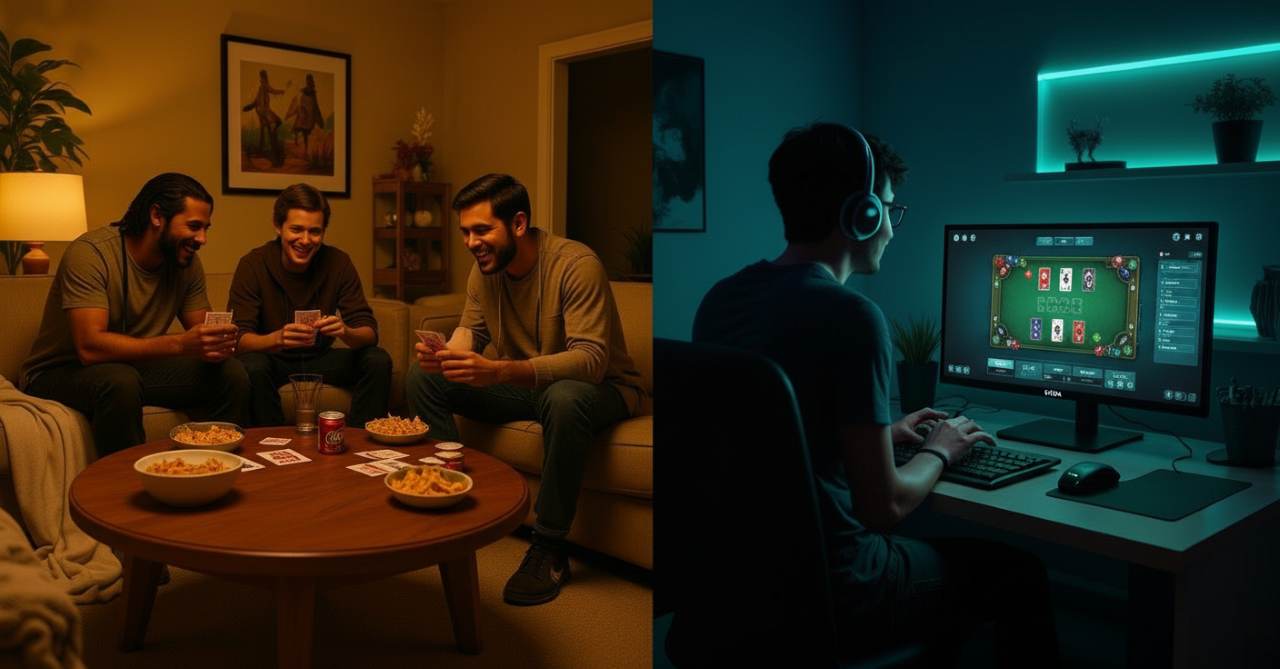
Picture this: four people gathered around a big wooden table. A deck of cards moves from hand to hand, there’s laughter, someone squints slyly, someone else tries to hide a smile.
The atmosphere is tense but warm. Now imagine a completely different scene: your laptop screen in a quiet room, you alone and HellSpin mobile app. Cards flash across the screen, your opponents are somewhere far away, and you’ll never see their faces. The game might be the same, but the feeling couldn’t be more different. Why is that? Let’s dig in.
The Live Table: A Theater of Emotions and Psychology
A face-to-face card game isn’t just about shuffling and dealing cards. It’s a small play where everyone has a role. Someone is the joker, someone keeps a poker face, someone else can’t hide emotions and gives themselves away with every win or loss.
Here, logic isn’t the only weapon — reading people is just as important. Psychologists call this social sensitivity — the ability to notice micro-gestures, tone of voice, or even a pause in speech. A true master wins not just because of the cards but because they caught a tremor in someone’s voice or noticed how their opponent bit their lip.
Playing live hones:
- Emotional intelligence — you understand people better.
- Stress resilience — mistakes are seen immediately, and you must handle the pressure.
- Communication skills — negotiation, jokes, support, even teasing become part of the game.
No wonder live players often turn out charismatic and confident in life. They find it easier to speak in public, make connections, and strike deals.
Online Play: Silence, Speed, and Strategy
Now let’s switch to online. Here, everything changes. There’s no laughter, no eye contact, no visible emotions. But that opens up entirely new opportunities.
First, the pace. Online platforms allow you to play dozens of rounds in a row. The approach becomes mathematical: calculating probabilities, analyzing strategies, practicing tactics. Less drama, more chess-like calm.
Second, anonymity. Nobody sees your face, nobody knows if your hand shook. The upside — you can focus entirely on the game. The downside — you lose the chance to practice reading people.
Psychologists note that online-focused players often show traits like:
- An analytical mind — quick calculations and forward planning.
- Patience and persistence — many matches last for hours.
- Independence — no need for approval or attention from others.
The flip side? They sometimes score lower in social skills, since the “mental game” is sharpened, but not the ability to read others.
Personality Differences: Live vs. Online Players
And here’s where things get interesting. Psychologists have compared players who stick strictly to live games with those who prefer online. The differences are striking.
- Live players tend to be extroverts. They value the social vibe, easily strike up conversations, and adapt quickly. They thrive on the energy of the crowd and the thrill of the moment.
- Online players lean more toward introversion. For them, inner concentration matters more than external impressions. They enjoy the analysis, not the banter.
In short: live players develop stronger social intelligence, while online players sharpen cognitive intelligence. Both become strong — just in different arenas.
So Who Wins?
It’s tempting to say live players are more emotional and online players are smarter. But that’s too simple. It depends on the individual. Sometimes an analytical introvert shines at the live table, while a charismatic extrovert becomes a star of online tournaments.
Still, there’s one nuance: live play shapes personality more deeply. Years of face-to-face games inevitably teach you to read people and interact. Years online make you a master of analysis and discipline but may erode ease in social settings.
The Psychological Takeaway
More and more psychologists suggest: don’t choose one over the other. Mix both. Live tables train emotional intelligence and confidence. Online trains logic and strategic thinking.
It’s like comparing weight training and yoga: one builds muscle, the other builds flexibility. Together, they bring balance.
A Twist at the End
Some studies reveal that people who mostly play live games tend to take more risks in real life — in business, travel, or relationships. Online players, on the other hand, are more cautious, calculating, and less impulsive. But here’s the twist: the strongest partnerships often come when the two combine. The extrovert takes the leap, the introvert provides backup.
So maybe the real victory isn’t choosing between online or offline — but sitting down and playing together.
